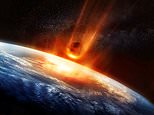With Hurricane Milton hitting winds of up to 180 miles per hour and at such a high speed, scientists are wondering if the storm defies the five category system and should go up to a Category 6.
Florida’s Gulf Coast braced on Tuesday for the impact of Hurricane Milton’s near-record winds and expected massive storm surge, which could bring destruction to areas already reeling from Helene’s devastation 12 days ago and still recovering from Ian’s wrath two years ago.
Almost the entirety of Florida’s west coast was under a hurricane warning early on Tuesday as the Category 5 storm and its 165mph winds crept toward the state at 9mph, sucking energy from the Gulf of Mexico’s warm water.
The strongest Atlantic hurricane on record is 1980’s Allen, which reached wind speeds of 190 mph as it moved through the Caribbean and Gulf before striking Texas and Mexico.
The storm, which CNN called 'the strongest on Earth in 2024,' was described by an Orlando meteorologist as 'nothing short of astronomical.'
'I am at a loss for words to meteorlogically describe you the storms small eye and intensity,' Noah Bergen said.
Bergen reported seeing wing gusts as high as 200 miles per hour with max sustained winds at 180 mph.
'This is now the 4th strongest hurricane ever recorded by pressure on this side of the world. The eye is TINY at nearly 3.8 miles wide. This hurricane is nearing the mathematical limit of what Earth's atmosphere over this ocean water can produce.'
It has many asking if the storm can or should be classified as a Category 6.
While no official designation exists, scientist and author Michael E. Mann said that '#Milton might have actually breached the 192 mph "cat 6" cutoff.'
The five categories, based on wind speed ranges, were used to designate hurricanes since the 1970s with what's known as the Saffir-Simpson Wind Scale, developed by engineer Herbert Saffir and Robert Simpson.
The barrier for Category 5 storms is winds of 157 miles per hour.
Simpson said in 1999 that the scale doesn't go past a Category 5 because they designed it to show the danger winds could cause buildings and to provide advice for those designing and constructing them.
Winds that would go past Category 5 would 'cause rupturing damages that are serious no matter how well it's engineered.'
Retired scientist Jim Kossin told USA Today that a Category 5 that goes from 157 mph and beyond is 'becoming more and more inadequate with time because climate change is creating more and more of these unprecedented intensities.'
Scientists expect the system to weaken slightly before landfall, though it could retain hurricane strength as it churns across central Florida toward the Atlantic Ocean.
That would largely spare other states ravaged by Helene, which killed at least 230 people on its path from Florida to the Appalachian Mountains.
Tampa Bay has not been hit directly by a major hurricane since 1921, and authorities fear luck is about to run out for the region and its 3.3 million residents.












